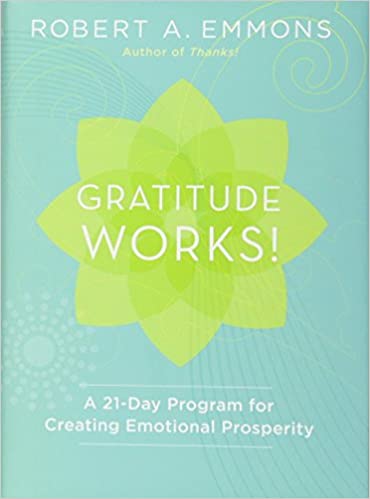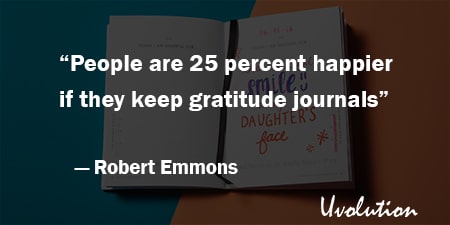Gratitude Works by Robert Emmons Book Summary
The Book in 1 Sentences
Gratitude Works!: A 21-Day Program for Creating Emotional Prosperity
“Because it is a virtue, gratitude, at least initially, requires mental discipline. Virtues do not come easily, and in some sense, we need them as they act as a counterpart to our natural tendencies.
This is the paradox of gratitude: although the evidence is clear that cultivating gratitude in our life and in our attitude to life allows us to flourish, it can be difficult to accomplish. Developing and sustaining a grateful outlook on life is easier said than done because the choice for gratitude rarely comes without some real effort.
We can put the science of gratitude to work for us, however. A number of evidence-based strategies, including self-guided journaling, reflective thinking, letter writing, and gratitude visits, have shown to be effective in creating sustainable gratefulness.
We will explore all of these practices in the chapters that follow. They will help you become good at gratitude. You will find that each time you make the choice for gratitude, the next choice will be a little easier, a little more automatic, a little freer. In doing so, we open ourselves up to the limitless possibilities for a fullness that life has to offer.” ~ Robert Emmons
5 BIG Ideas
Gratitude Works Book Summary
1. Why gratitude works?
“As showcased in my previous book Thanks!, groundbreaking research has shown that when
people regularly cultivate gratitude, they experience a multitude of psychological, physical,
interpersonal, and spiritual benefits.
Gratitude has one of the strongest links to mental health and satisfaction with life of any personality trait—more so than even optimism, hope, or compassion. Grateful people experience higher levels of positive emotions such as joy, enthusiasm, love, happiness, and optimism, and gratitude as a discipline protects us from the destructive impulses of envy, resentment, greed, and bitterness.
People who experience gratitude can cope more effectively with everyday stress, show increased resilience in the face of trauma-induced stress, recover more quickly from illness, and enjoy more robust physical health. Many of these effects are quantifiable. Consider these eye-popping statistics.
People are 25 percent happier if they keep gratitude journals, sleep one-half hour more per evening, and exercise 33 percent more each week compared to persons who are not keeping these journals.
Experiencing gratitude leads to increased feelings of connectedness, improved relationships, and even altruism. We have also found that when people experience gratitude, they feel more loving, more forgiving, and closer to God.”
Robert also says: “Dozens of research studies with diverse participant groups have also
revealed that the practice of gratitude leads to the following:
- Increased feelings of energy, alertness, enthusiasm, and vigor
- Success in achieving personal goals
- Better coping with stress
- Bolstered feelings of self-worth and self-confidence
- Generosity and helpfulness
- Improved cardiac health through increases in vagal tone
- Greater sense of purpose and resilience”
“All in all, science confirms that the life-giving practice of gratitude broadens our lives by enabling healing of the past, providing contentment in the present, and delivering hope for the future.”
2. Practicing gratitude
“This is a book of practices. It is all about the concrete things you can do to grow your mind and direct your actions toward gratefulness. I have found the organic metaphor of growing gratitude to be a powerful way of conveying basic truths about the nature of this quality.
It is about cultivating a grateful disposition, which is an inclination that can become deeply ingrained.
Through practice, giving thanks grows from the ground of one’s being. Grateful feelings,
once buried, can surface if we take the time to notice and reflect. A Russian proverb says that
‘gratitude waters old friendships and makes new ones sprout.’
Gratitude is like fertilizer for the mind, spreading connections and improving its function in nearly every realm of experience. ...
My hope is that this book will give you all of the gardening tools that you need to shape and grow your grateful thoughts and to weed-whack the ungrateful ones.”
“There is frequently a divide between what we know we ought to do and how we actually wind up behaving. Psychologists call this the knowledge to performance gap. Similarly, there is a gulf between knowing that we ought to feel grateful and how we usually do feel. The depressing reality is that people often fail to live up to what they know they should do or even want to do.”
Becoming aware
“But as the ancient sages and contemporary research tells us, becoming aware of one’s
blessings actually leads to having more to be grateful about.”
“The genetic programming here is not strong. We can all have [more gratitude] and we can have more of it if we systematically train ourselves to pay attention to what is going right in our lives, to see the contributions others make in those good things, and express gratitude verbally and behaviorally.”
“Angeles Arrien, author of Living in Gratitude: A Journey That Will Change Your Life, describes grateful seeing as ‘the ability to look first at what is good and working in our lives without minimizing or denying the hardships that are also present.’”
Gratitude journaling
“One of the best ways to cultivate gratitude is to establish a daily practice in which you remind
yourself of the gifts, grace, benefits, and good things you enjoy. When we are grateful, we affirm that sources of goodness exist in our lives.
By writing each day, we magnify and expand on these sources of goodness. Setting aside time on a daily basis to recall moments of gratitude associated with even mundane or ordinary events, personal attributes one has, or valued people one encounters has the potential to weave together a sustainable life theme of gratefulness just as it nourishes a fundamentally affirming life stance. ...
Gratitude journaling promotes the savoring of positive life experiences and situations so that we can distill the maximum satisfaction and enjoyment from them. This promotes a shift in consciousness from what we are lacking to the abundance that surrounds us. Gratitude leads us to affirm and acknowledge the good things in our lives. ...
And because you can’t be grateful and negative at the same time, it counteracts feelings of envy, anger, greed, and other states harmful to happiness.”
“The act of writing down your blessings translates your thoughts into words, and writing has been shown to have advantages over just thinking the thoughts. Writing helps to organize thoughts, facilitate integration, and helps you accept your own experiences and put them in context.”
“Seek gratitude density. Be specific. Go for depth over breadth. Give details for each entry. The journal is more than just a list of stuff.”
“include some surprises. What unexpected blessings did you benefit from today? What were you dreading that did not happen?”
“Use the language of gifts. Think of the benefits you received today as gifts. Relish and savor the gifts you have been given.”
“Think about and then write down those aspects of your life that you are prone to take for granted. Instead, take them as granted.”
3. The biggest obstacle to gratitude - and its remedy
“Since the time of the ancient philosopher Seneca or before, having a overly high opinion
of oneself has been seen as the chief obstacle of feeling and expressing gratitude.
Research has shown that people who are ungrateful tend to have a sense of excessive self-importance, arrogance, vanity, and a high need for admiration and approval. At the more pathological end of the scale are narcissists, people who are profoundly self-absorbed and lack the empathy needed for entering deep, satisfying, mutually enhancing interpersonal relationships.
At the more ordinary end of things are people who just feel entitled—to good grades, exemption from having to follow the rules, and special treatment of all kinds. The entitlement attitude says, ‘life owes me something’ or ‘people owe me something’ or ‘I deserve this.’
In all its manifestations, a preoccupation with the self can cause us to forget our benefits and our benefactors or to feel that we are owed things from others and therefore have no reason to feel thankful.”
“The more I contemplate the requirements for cultivating gratitude, the more I am convinced of the necessity of humility. In gratitude and humility we turn to realities outside of ourselves. We become aware of our limitations and our need to rely on others.
In gratitude and humility, we acknowledge the myth of self-sufficiency. We look upward and outward to the sources that sustain us. Becoming aware of realities greater than ourselves shields us from the illusion of being self-made, being here on this planet by right—expecting everything and owing nothing.
The humble person says that life is a gift to be grateful for, not a right to be claimed. Humility ushers in a grateful response.”
4. The “death” exercise
“A further illustration of the ‘bad to good’ phenomenon comes from research on confronting
one’s own mortality. This recent study found that thinking about one’s own death could make a person more grateful for the life that he or she has.
Researchers asked participants to imagine a ‘death’ scenario where, trapped in a high rise, they are overcome by smoke and perish in a fire. They were then asked to respond to a series of questions convening their present levels of gratitude.
The death reflection condition produced a greater increase in gratitude in comparison to two control conditions. Confronting the possibility of dying may lead a person to realize the accuracy of the British writer G.K. Chesterton’s insight that ‘life is not only a pleasure but a kind of eccentric privilege.’”
5. Transform adversity into opportunity
“I believe that gratitude is the best approach to life. When life is going well, it allows us to celebrate and magnify the goodness.
When life is going badly, it provides a perspective by which we can view life in its entirety and not be overwhelmed by temporary experiences.
And this is what grateful people do. They have learned to transform adversity into opportunity no matter what happens, to see existence itself as a gift.”
That was my QUICK summary of the great book Gratitude Works by Robert Emmons. If you’re interested, get your copy. There is a HUGE amount of life-changing ideas in this book, and we’ve only touched on a tiny bit of it.
Buy The Book: Gratitude Works by Robert Emmons

GET Blinkist 7 Days FREE Trial
3000+ Book Summaries
(Audio and Text)








